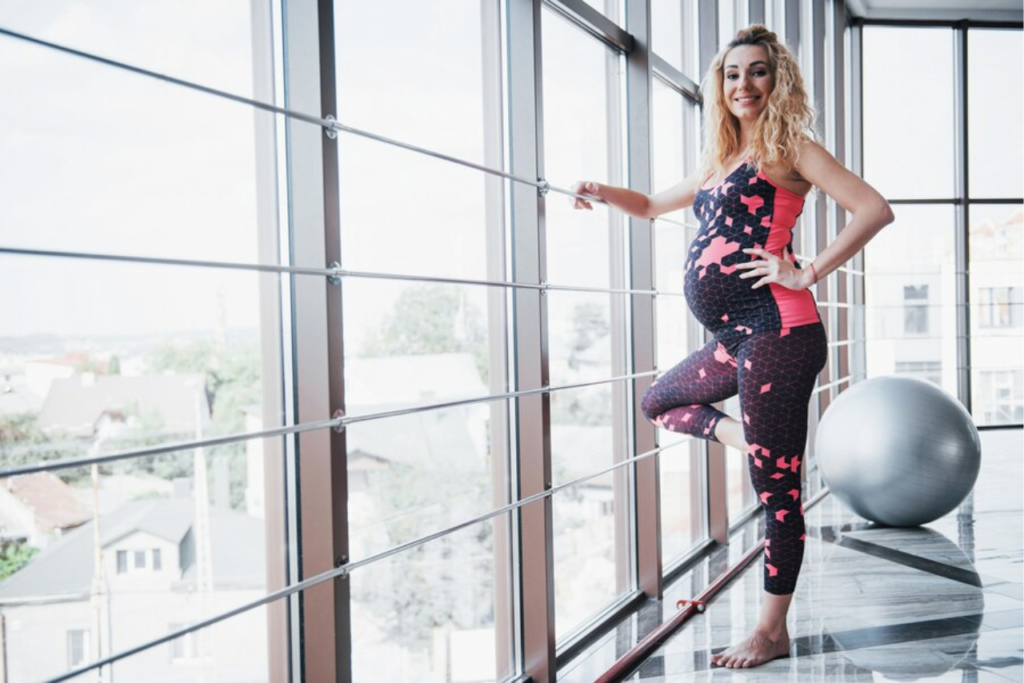Pregnancy is a special time in a woman’s life and with that comes many changes and questions. One of the most common questions many pregnant women have is “Can I jump on a trampoline while pregnant?” The answer to this question isn’t so simple, but it is important to know what activities are safe and which should be avoided during pregnancy.
Trampolining can be an enjoyable activity, but unfortunately, it isn’t recommended for pregnant women. According to the American College of Obstetricians and Gynecologists (ACOG), jumping on a trampoline can increase the risk of falling or experiencing abdominal trauma due to the bouncing motion. If you fall while pregnant, you could put your baby at risk for serious injury or even death.
In addition to the safety risks associated with trampolining, there are other risks that come with bouncing on a trampoline while pregnant. The sudden jerking motion can cause strain on your joints and muscles which can lead to aches and pains in your body. It can also cause issues with your balance as well as fatigue due to overexertion. This is especially true if you are not used to exercising regularly or if you are already experiencing fatigue from being pregnant.
It is important to keep in mind that every woman’s pregnancy is diffeent and each one carries different risks. If you do choose to jump on a trampoline while pregnant, it’s best for you to consult with your doctor first so that they can evaluate any potential risks for you and your baby. They will also be able to provide advice about how much exercise is appropriate for you at each stage of your pregnancy.
Overall, jumping on a trampoline while pregnant isn’t recommended due to the potential risks associated with it. However, if your doctor has cleared you and given the okay then it may be possible for some women who have prior experience with high-impact workouts like aerobics or jogging safely partake in such activities during pregnancy – just make sure that you always listen to your body and take frequent breaks if needed!
Is Trampolining Safe During Pregnancy?
No, it is not safe to trampoline while pregnant. Trampolining is a high-impact activity that can increase your risk of falling or jarring your body, which can be dangerous for both you and your baby. Additionally, the bouncing motion can put strain on the joints and ligaments in your pelvis that are already loosened by hormones during pregnancy, making them more susceptible to injury. As an alternative to trampolining, try low-impact activities such as swimming or gentle yoga that will help keep you active while ensuring the safety of both you and your baby.

The Potential Risks of Jumping During Pregnancy
Jumping can be harmful to the baby during pregnancy, depending on the level of intensity. High-impact activities such as jumping jacks or running can increase the mother’s risk of injury, preterm labor, and miscarriage. If a woman has a history of high-risk pregnancies, she should avoid any form of jumping altogether. However, if a woman is experienced with jogging and aerobics, she may be able to do low-impact jumping safely under the supervision of her doctor. It is important for pregnant women to stay wthin their limits and listen to their bodies during exercise in order to reduce the risk of harm to their baby.
Is Jumping on a Trampoline Safe During the First Trimester?
The answer to this question is that, while jumping on a trampoline during the first trimester is generally considered safe and unlkely to cause any harm to you or your baby, it’s important to take some precautions. Firstly, you should be aware that trampolines can be dangerous and consult with your healthcare provider before engaging in any type of physical activity in pregnancy. Secondly, it’s important to be gentle when jumping on a trampoline. Avoid excessive bouncing or jarring movements and listen to your body when exercising. Lastly, pay attention to your surroundings and make sure the trampoline is in good condition before using it.
Is Jumping on a Trampoline Safe During Pregnancy at 21 Weeks?
No, it is not recommended to jump on a trampoline while 21 weeks pregnant. Trampolines can be an unpredictable surface with the potential for jarring and bouncing, which can cause undue stress to the baby and mother. Additionally, the risk of falling off or losing balance increases with pregnancy due to the centre of gravity changing as the baby grows. This could lead to serious injury and complications for both mom and baby. Therefore, it is best to avoid activities such as jumping on a trampoline during pregnancy.
When Is It Safe to Stop Jumping During Pregnancy?
It is important to stop jumping during pregnancy, as it can increase the risk of preterm labor and miscarriage. Generally speaking, it is recommended that you stop jumping in the first trimester (generally around 12 weeks) and throughout the rest of your pregnancy. Although some women may be able to continue jumping until their second trimester, it is important to listen to your body and take caution if you experience any pain or discomfort. If you are unsure about continuing with a certain exercise during your pregnancy, please consult with your doctor for specific advice.

Is Jumping on a Trampoline Safe During Pregnancy at 7 Weeks?
No, it is not recommended to jump on a trampoline during the first trimester of pregnancy. During this time, your body and your baby are in a vulnerable stage of development. Impact from jumping on a trampoline can cause the fetus to experience trauma or injury. Additionally, the jarring motions and changes in pressure can place an undue strain on ligaments and cause increased discomfort to the mother-to-be. For these reasons, it is best to avoid any bouncing activities while 7 weeks pregnant.
Risk of Miscarriage Due to Jumping
No, jumping would not cause a miscarriage. Miscarriage is typically caused by chromosomal or genetic abnormalities in the fetus, an infection, medical conditions such as diabetes or hypertension, or lifestyle factors such as smoking or drinking alcohol. Jumping is a normal activity for a healthy pregnant woman and should not cause her to miscarry.
Causes of Accidental Miscarriage
Accidental causes of miscarriage can include trauma or injury to the abdomen, exposure to certain toxins such as pesticides, radiation, smoking, and drug use. Certain medical conditions such as uncontrolled diabetes and high blood pressure may also increase the risk of miscarriage. Certain infections such as listeria, toxoplasmosis, and rubella may also cause a miscarriage. Finally, lifestyle factors like significant stress or over-exertion can also lead to a miscarriage. It is important for women to take steps to minimize any risks that cold potentially lead to a miscarriage. This includes avoiding unnecessary medications or drugs, eating well balanced meals with plenty of fruits and vegetables, limiting caffeine intake, avoiding smoking or secondhand smoke exposure, and getting regular prenatal care from your doctor.
Is It Safe to Go on a Bouncy Castle While Pregnant?
No, it is not recommended to go on a bouncy castle when pregnant due to the increased risk of injury. Falls, trips and bumps are common on bouncy castles, and the added weight of being pregnant further increases the likelihood of an accident. Pregnant women are more prone to joint injuries, and the bouncing motion can put strain on these areas. If you do choose to go on a bouncy castle while pregnant, it is best to do so with extreme caution and ensure that the surface is well-maintained. Additionally, it miht be best to use a spotter in case you need help getting off quickly or your balance is compromised.

Is Jumping on a Trampoline Safe for Pregnant Women at 34 Weeks?
It is not recommended to jump on a trampoline at 34 weeks pregnant unless it is specifically approved by your doctor. If you have been given medical clearance, there are certain measures you can take to minimize the risk of hurting yourself. To begin with, make sure that the trampoline is in good condition, and that there are no sharp edges or objects on the springs or surface of the trampoline. Ensure that the trampoline is on a level surface and kept away from other objects that may caue injury. Limit your time jumping to no more than 10 minutes and avoid any high impact or extreme movements. Additionally, wear comfortable clothing and supportive shoes for extra protection.
Conclusion
In conclusion, pregnant women should take extra caution when it comes to their physical activity. Low-impact exercises such as walking and swimming are great options for pregnant women, while high-impact activities like aerobics and jogging should only be done if the woman is experienced in these activities. Jumping jacks, skipping, and othr similar activities should be avoided completely. While motion caused by jumping may seem concerning to some expecting mothers, research has shown that the baby remains safe and comfortable in the uterus. It is important for pregnant women to listen to their bodies and take it easy when needed. With the right guidance and care, pregnant women can still enjoy a safe exercise routine.
